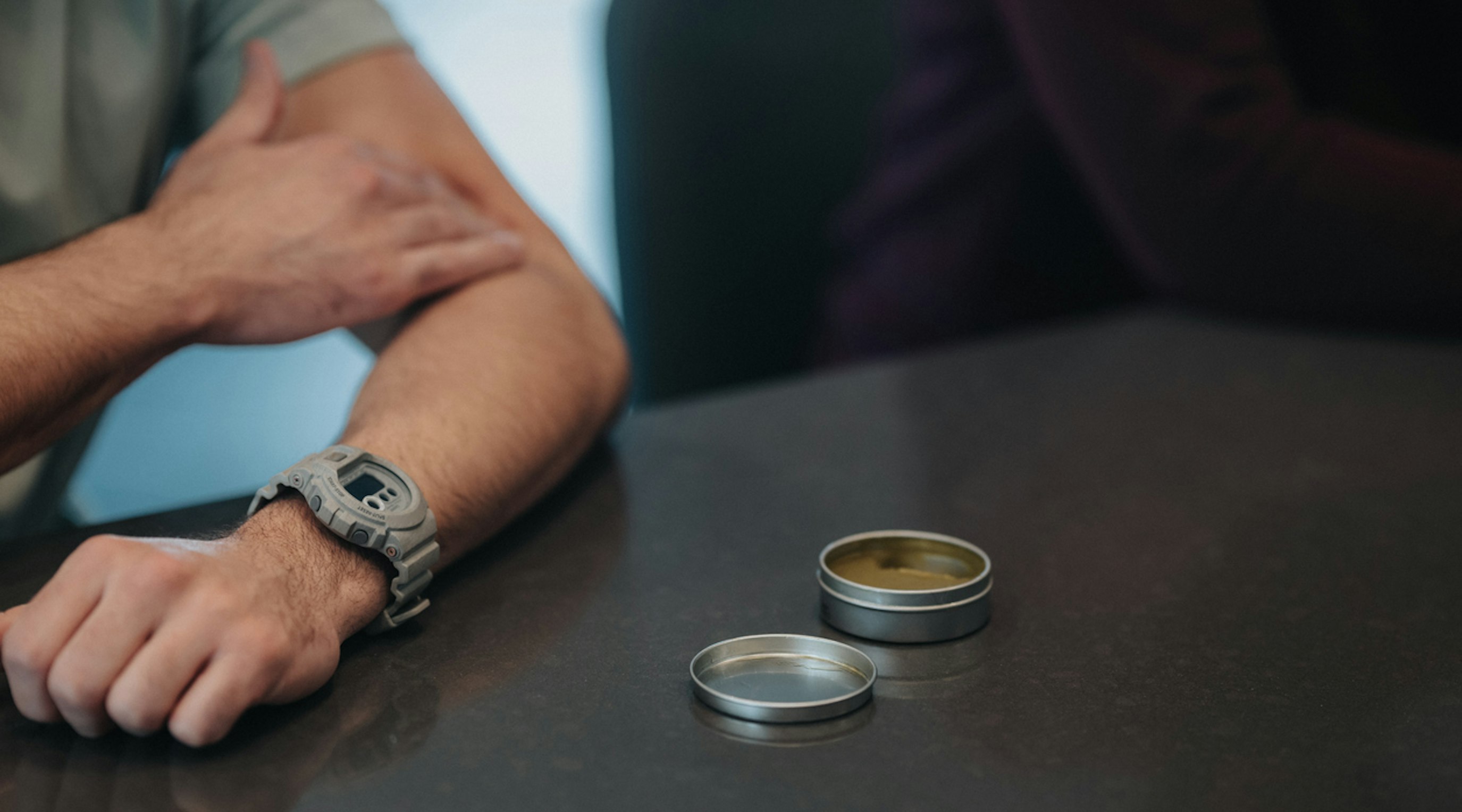CBD topicals work in a number of different ways that we know about so far, but more research is needed to fully appreciate and understand the complex nature of our skin's interactions with cannabinoids.
Contents
What is a topical?
A topical, in regard to medicine and healthcare, is a product designed to be applied directly to the skin. A topical usually contains medically active or therapeutic compounds in specific doses and is applied to treat a whole range of different conditions depending on the active ingredients.
They come in different forms: oil-based and water-based. They can be creams, balms, ointments, and salves. All of these options may be suitable for a wide range of medical conditions that affect the skin
What ingredients are used in topicals?
Topicals will have a different base ingredient depending on the type of application it is intended for. These ingredients may be natural, but there are also a great variety of medically approved extracts and formulations that help active ingredients cross through the skin barrier to treat the affected area or help it pass into the bloodstream.
If you’ve ever looked at the ingredients on any kind of skin or hand cream, you’ve probably seen the scientific names that are listed. This is because they have been developed to help maintain the quality of the product for a long period of time or to help the active ingredient become pharmacologically active.
Why would people want to apply CBD in a topical?
If a patient has an external or localised internal complaint that may be able to be treated with CBD, using CBD in a topical form can directly deliver the cannabinoid to the affected area and potentially help alleviate the related symptoms. CBD topicals have shown promise in being helpful to patients that have skin irritation, joint pain and inflammation, neuropathic pain and a number of other diagnosed conditions, but equally CBD topicals may be beneficial when applied to help aid recovery from sports, exertion and daily aches.
How much CBD is in CBD topicals?
The amount of CBD that is in a topical preparation will depend on the product, as different companies will create products with different uses in mind. The dosage information and total CBD volume in all products should be displayed clearly and without confusion on the packaging. If this is not available, it can be seen as a red flag and may indicate that the manufacturers don’t want you to know how little CBD is in it. Trustworthy products clearly display how much CBD is in their topicals.
How does a CBD topical work?
CBD in topicals may have the potential to work by interacting with the cannabinoid receptors CB1 and CB2 which are located in the epidermis, muscle, bone, and white blood cells. Studies have shown that the CB1 receptor plays a crucial role in pain management, while the CB2 receptor is primarily associated with inflammation and immune system functions.
CBD could have a strong anti-inflammatory action. Research conducted in clinical settings has revealed that pro-inflammatory cytokine levels are reduced by CBD, as well as the inhibition of T cell proliferation. CBD also induces T cell apoptosis and reduces the migration and adhesion of immune cells. In a nutshell, this means that CBD may help the cells that help clear external pathogens. Once this process has been completed, the cells die and then make way for the body to produce new T-cells to keep performing the essential tasks.
CBD has also been discovered to be active at GABA receptor sites which are also found on the skin in the epidermal keratinocytes, which accelerate cutaneous barrier recovery.
How long does it take for CBD topicals to take effect and start working?
Patients report that CBD topicals start being felt around ten minutes after application, but it can take between 45 and 90 minutes for some patients to feel relief. The dose does have an effect on the level of relief that can be felt.
How much CBD topical should I apply?
If you are being prescribed a CBD topical, discuss dosing amounts and frequency with your prescribing doctor. It's important to note that CBD topicals don't pose a risk for overdose.
However, there is a saturation point at which using more won't have any additional benefits. It may also be possible to experience issues if too much topical is applied and the skin is unable to breathe properly due to the ingredients.
How frequently should I apply CBD topicals?
CBD topicals are thought to be generally safe to apply as frequently as needed, just take note of any negative changes and monitor the frequency based on this. Your prescribing doctor will give you dosage and frequency application advice to follow, or the product packaging will list instructions.
What are the known benefits of CBD topicals?
CBD Topicals are applied by patients with a number of different conditions. CBD topicals have shown the potential to possess excellent anti-itching properties that can help protect the skin from external damage. Skin conditions such as eczema, psoriasis, dermatitis, acne, and rosacea may all be benefitted from topical application of CBD.
Whilst CBD topicals may also reduce inflammation and add an extra layer of protection for the surface of the skin with the ability to promote healing, transdermal absorption allows CBD to reach CB2 receptors in the muscles and joints. This may bring down inflammation in the joints that could cause arthritis, osteoarthritis and related conditions, showing that autoimmune diseases and similar conditions can benefit from the administration of CBD. The method of action is believed to work by bringing down the swelling inside the joints, which is the cause of the pain when extra pressure is put on the nerves.
The ultimate benefit of CBD balm is its possible potential to reduce pain and inflammation with increased mobility, leading to a better quality of life and the ability for patients to participate in more activities.
CBD topicals may also be beneficial for post-workout care of your joints and muscles, helping to speed up recovery times.
What are the negative effects of using CBD topicals?
There have been no reported negative effects that are a serious cause of concern from using CBD as an active ingredient in topicals. However, if you do experience any negative effects, please contact the CBD topical provider and discuss the issue with them.
CBD may have negative interactions with certain medications, so always seek advice from a doctor if you're on a treatment plan that involves pharmaceuticals.
How long should I continue to apply CBD topicals?
This is a discussion you will need to have with your prescribing doctor. They will be able to give you the best advice pertaining to dosage size and the period that a CBD topical should be applied for your specific condition.
Are CBD topicals right for me?
If you have an ongoing skin complaint, and are having difficulty controlling the symptoms, it may be the time to give CBD topicals a try. If you have inflammation or pain in your skin, muscles or joints, CBD topicals may be appropriate for you. Again, talk to your prescribing doctor before making any decisions regarding CBD administration.
What should I do if I have a bad reaction to a CBD topical?
If you have a bad reaction to using a CBD topical, you should stop using it immediately and contact your prescribing doctor to discuss the issue. They may be able to offer some advice to counter the negative effects or advise you otherwise.
Conclusion
In conclusion, CBD topicals have the potential to bring a transformative change to the landscape of topical treatments, offering potential benefits for a wide range of conditions from skin irritations to joint pain and inflammation. It is vital, however, for potential pateints to consult with healthcare providers to determine the appropriate dosing and frequency, as well as to be cognizant of the CBD content in their chosen products. The emergence of CBD topicals signifies a promising stride forward in medicinal therapy, as we continue to explore and appreciate the multifaceted benefits of this cannabinoid. At Releaf, we endeavour to support this evolution, providing tailored medical cannabis solutions to improve the quality of life for those in need.
Releaf understands that medical cannabis can be life-changing for many people. That's why we offer tailored monthly packages based on your cannabis prescription, specialist consultations for medical cannabis, and a unique medical cannabis card for protection.
Share article
Did you like this article?
It is important to seek medical advice before starting any new treatments. The patient advisors at Releaf are available to provide expert advice and support. Alternatively, click here to book a consultation with one of our specialist doctors.
Elevate your wellness with medical cannabis
Get comprehensive care, convenience, and confidence with an all-in-one treatment plan.
Am I eligible?Authors
Editorial Team
Article written by the Releaf Editorial Team, a group of seasoned experts in cannabis healthcare, dedicated to enhancing awareness and accessibility in the field through their wealth of knowledge and experience.
Editorial Policy
All of our articles are written by medical cannabis experts, guided by strict sourcing guidelines, and reference peer-reviewed studies and credible academic research. Our expert clinical team and compliance specialists provide valuable insights to ensure accuracy when required. Learn more in our editorial policy.
Need more help?










